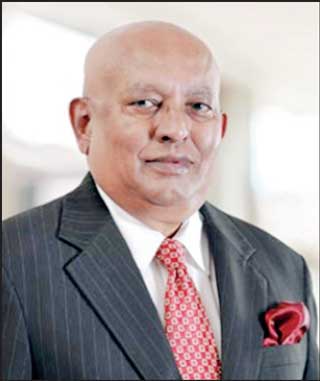Sunday Feb 22, 2026
Sunday Feb 22, 2026
Friday, 2 July 2021 00:00 - - {{hitsCtrl.values.hits}}
 |
| DIMO Chairman Ranjith Pandithage
|
New entrant to agriculture with impressive success, DIMO, has flagged off concerns over the sudden and aggressive shift to 100% organic fertiliser urging the Government to reconsider it or adopt a staggered approach.
“Recent announcement banning the import of inorganic and agrochemicals will have an adverse effect,” Diesel and Motor Engineering PLC Chairman Ranjith Pandithage said.
“This decision will affect our business prospects in the short and medium term, unless a revision is made to the new regulations announced. Whilst fully appreciating the need to control the harmful effects of inorganic fertilisers and agrochemicals, we propose a staggered approach in implementing such a policy,” Pandithage said in the Chairman’s Review of DIMO’s Annual Report for FY21.
His concerns and recommendations come after DIMO has successfully forayed into agriculture two years ago as part of strategic diversification.
“Our foray into agriculture has so far delivered excellent results. The fertiliser business grew from strength to strength whilst subsidiaries in agrochemicals and seeds, acquired three years ago, produced good gains,” Pandithage said.
The agriculture segment generated impressive results with a 384% increase to Rs. 600 million in FY21 from Rs. 124 million in FY20. It contributed to 19% of the Group results compared to the 4% in FY20. Revenue more than doubled to Rs. 7.56 billion.
DIMO’s agriculture business comprises of sale of agri machinery, agri machinery after services, sale of fertiliser, seeds, agrochemicals and speciality fertilisers. It opened a 25-acre Agri Techno Park in Lindula in FY21 and improved value proposition of agri machinery division leading to improved market share. It also launched DIMO Foot Print range which promotes sustainable home gardening in urban areas.
DIMO said in FY21 sales of fertiliser, agrochemicals and agri machinery were the key contributors. The power of the ‘DIMO Pohora’ brand was evident in a 657% increase in fertiliser sales in 2020/21. Lower lending rates also helped to boost the increase in agri machinery sales whilst favourable weather conditions undoubtedly contributed to the results.
The agriculture segment has surpassed DIMO’s traditionally strong motor segment with the latter impacted by the import ban. Motor segment’s contribution was 11% to Group results, down from 22% in FY20. However with vehicle after service contribution of 31%, the overall motor sector still remains dominant.
DIMO Chairman Pandithage said going forward, as a country, Sri Lanka is in possession of key resources for agricultural development. “Therefore, notwithstanding the current policy (rush towards 100% organic), we will seek further opportunities in agriculture including postharvest value addition,” he said adding “We believe DIMO should stand firm with the view of facilitating growth in the agriculture sector.”
In FY22 DIMO plans to introduce value-added agri products, assess the impact of Government restrictions on inorganic fertiliser and pesticide imports and re-allocate existing resources. It will also generate new streams of revenue through Research and Development.
In FY 21 DIMO Group revenue fell by 11% to Rs. 30.8 billion largely due to a 53% or Rs. 7.3 billion dip in motor sales revenue. Robust performance of agriculture helped to cushion the impact as well as contributed to a better bottom line along with a 44% dip in net finance cost. Group after-tax profit rose by 167% to Rs. 536 million and pre-tax profit rose 158% to Rs. 720 million.
